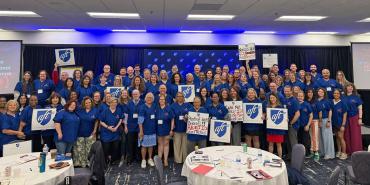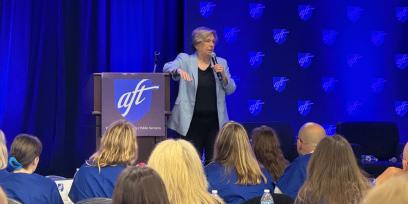Nurses, doctors and other health professionals converged for this year’s AFT Nurses and Health Professionals Professional Issues Conference in Chicago from June 11-13, determined to set a course for the coming year: defending patients, protecting communities, and beating back the authoritarian tide washing over American democracy.
This year’s theme, “Protecting Patients, Healthcare and Communities,” was the rallying cry for attendees. Two intensive pre‑conference meetings set the tone. One, led by mass‑mobilization trainers, walked participants through the mechanics of peaceful resistance.
“Turning around democratic backsliding is not easy but it can be done. Especially when unions are part of the resistance, ... it takes team democracy; joining with others and exercising our people power and mobilizing, said Kelly Nedrow, assistant to the president, AFT Strategic Priorities, described the mass mobilization as one focused on how the labor movement can challenge authoritarian incursion. “This training will give you the tools to implement peaceful resistance and nonviolent non-cooperation.”
Monica Hunken, a veteran organizer who has run nonviolent‑action boot camps across the country, urged participants to see mobilization as a skill everyone can master. “There is this massive authoritarian takeover happening at every level in the fabric of our lives, so we need to create a resistance that is within the fabric of our lives by finding what you can do within your skill set to intervene.”
The other meeting—aimed at doctors and advanced‑practice clinicians addressed the unique challenges they face.
A call for coalition
Chicago Teachers Union President Stacy Davis Gates formally welcomed attendees on the opening morning. “Let me welcome you to the beautiful city of Chicago, where the labor movement has helped to shape a space where workers feel very freely to behave as if we own this space, because we do.”
She called on attendees to think about labor’s work in collective bargaining, organizing and building community as a revolutionary act of bargaining for the common good and to understand why it's important to bargain for the common good. “Common good requires coalition, because coalition is the only way that you can create the community that's going to be necessary to push back on things called big and beautiful bills that will gut the society that we understand now,” said Davis Gates, who is an AFT vice president.
Davis Gates described the current political climate as “a game of ‘Survivor,’” in which the only path to victory is coalition. “Labor. We are the anchor to how we make it better, and the only way we do that is through the practice of solidarity.” She called on attendees to rise to the occasion and to challenge their members to lead and organize. Don’t be afraid to “flex your union as an agent of revolutionary change.”
John Brady, AFT Connecticut vice president and co-chair of the AFT Nurses and Health Professionals program and policy council picked up the thread. “I've never been prouder to know that we are united and ready to mobilize to protect our democracy, our patients, the healthcare industry and our communities. The word ‘unprecedented’ seems to take on new meaning every day, but our healthcare members continue to fight on the frontlines, demanding safe staffing ratios, an end to workplace violence, and the right to a voice on the job.”
Building power from within
In an opening session, health‑policy analyst Dr. Vin Gupta warned what potential cuts to federal healthcare programs and the elimination of federal funding for gender-affirming care and Planned Parenthood would mean to healthcare. He also stressed the critical need to combat health misinformation and protect healthcare access for vulnerable populations, including immigrants and those on Medicaid.
“We're in a really difficult, tender moment,” Gupta said. In terms of health misinformation and how the country can push back, Gupta noted that most Americans don’t want the country to go in this direction. “I don't think that they're looking at [the Advisory Committee on Immunization Practices] and what's happening with the [Centers for Disease Control and Prevention] and the [Food and Drug Administration], and approve of that, but we have to figure out a way to reach people in a scalable way” with the facts before the cuts hit home.
A panel brought the concepts of safeguarding democracy with real-world examination. Anne Goldman, co-chair of the AFT Nurses and Health Professionals program and policy council and United Federation of Teachers vice president for non-Department of Education and private sector members; Richard Botterill, Oregon Nurses Association bargaining unit chair at Providence Portland Medical Center; and Ramiro Hernandez, an AFT regional director, dissected recent organizing wins.
Goldman described how her bargaining unit at NYU Langone Health filed 6,000 staffing grievances, then bought a local‑TV ad during the Super Bowl to shame the hospital for spending on commercials instead of nurses. “The most recent win for us was the contract averting a strike, but it was indeed a very vicious, vicious battle with NYU, which is now a big conglomerate on the East Coast. But as big as they are, we beat them, and we're proud. This has never been easy, and the focus is unending, but so are the stakes. There's nothing more important than succeeding, because the outcome is to care for everyone in a particular way that is dignified and respectful, and it's unacceptable to compromise that,” said Goldman.
Botterill recounted a 46‑day strike by members at Oregon’s Providence hospitals that ended with a 95‑percent ratification vote and thousands in retro pay for some caregivers. Keeping momentum after a strike, he said, comes down to “communication, communication, communication. I don’t think you can overdo it.”
Hernandez described how bus drivers in Albuquerque, N.M., built a union through card check. He advised identifying existing networks and leaders within the workplace and providing small, manageable tasks to build their confidence and involvement.
Democracy or autocracy
In a keynote that stretched the evolution of the labor movement, AFT President Randi Weingarten laid out the stakes as she sees them: a choice between a democracy or an autocracy.
“The people in power today … actually want themselves and their families to stay in power. They don't really care about anybody else,” she said.
Weingarten argued that the nation stands at the same fork in the road faced by workers in South Korea’s pro‑democracy uprising. Authoritarians test, she warned, noting that members have to fight for the America we want. “The only way we can really fight it is through peaceful, nonviolence on the streets. That's the only way.”
Weingarten argued that labor’s public approval makes the movement indispensable to preserving constitutional rights. “What I know from history is this: The backsliding is here; we are in that moment where it could be democracy, or dictatorship, but people beat back dictatorship,” said Weingarten. “You can beat it back by doing nothing; that has happened in 7 percent of cases; but in 50 percent of cases, it gets beaten back if there's civic engagement on a routine basis. In 80 percent of cases, it gets beaten back when the labor movement is involved,” she said. “When you got nurses and hardhats and teachers and doctors and welders and machinists all together saying, no, we want a voice at work, and we want a voice in this democracy, and we want that voice, so our families have a better life tomorrow than they had today. That's the road we're taking.”
By late afternoon, the theory turned into practice. Members, wearing their AFT-branded scrubs, spilled into the downtown Chicago streets, with handmade signs held high to join protests of the Trump administration’s stepped‑up immigration raids.
Knowing—and exercising—your rights
A “know your rights” panel featuring Leila Levi, senior counsel at the National Women’s Law Center; Matthew Lopas of the National Immigration Law Center ;and Jessica Rutter, former general counsel at the National Labor Relations Board armed participants with practical defenses against the criminalization of healthcare.
A panel focused on the outlook for health policy featured Jane Sheehan of Families USA and Tennessee state Rep. Aftyn Behn. Sheehan detailed the reconciliation bill’s cuts that would hit millions of Americans. Behn discussed Tennessee's healthcare crisis, including high maternal mortality and rural hospital closures. Both emphasized the need for advocacy and organizing, particularly in conservative states. They also discussed the importance of protecting Medicaid, addressing medical debt, and the impact of private equity on healthcare. The conversation underscored the urgency of defending healthcare access and equity.
A panel on “expert storytelling” focused on the importance of storytelling in healthcare advocacy. Scott Palmer, chief of staff for the Oregon Nurses Association, emphasized the power of storytelling to connect personal experiences with broader issues. Nicole Gaudiano, AFT director of media affairs and storytelling, highlighted the success of story banks in amplifying local stories nationally. The panelists also discussed strategies for effective media pitches, stressing the need for timeliness, human interest and making reporters' jobs easier.
Between plenaries, workshops covered topics such as artificial intelligence in healthcare, advancing health equity, workplace violence prevention, and immigration policy in healthcare settings. By the end of the conference, attendees were prepared to fight for better healthcare and a functional democracy.
[Adrienne Coles]



